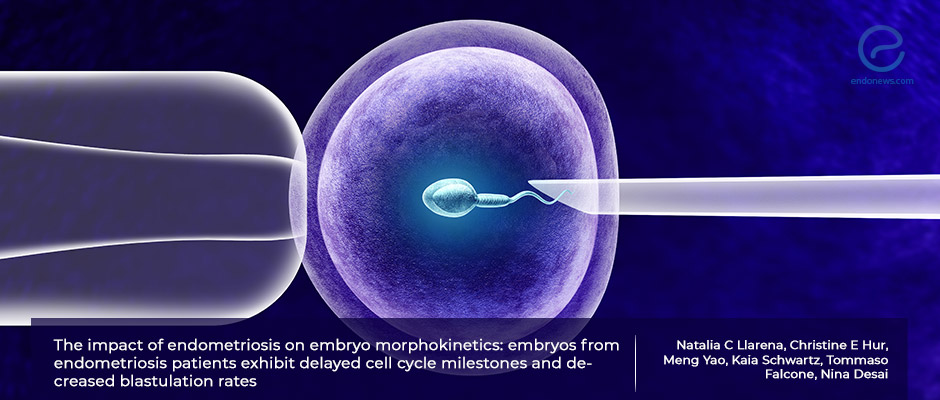Endometriosis Seems to Affect The Development of the Embryo
Mar 7, 2022
Embryos from women with endometriosis have delayed cell cycle milestones and decreased blastulation rates.
Key Points
Highlights:
- Both early and late developmental events are impaired in embryos from women with endometriosis.
- These embryos progress to morula, blastocyst, and expanded blastocyst stages slower than embryos from women without the disease.
Importance:
- These findings provide insight into how endometriosis may affect embryonic development.
What's done here:
- Researchers analyzed the morphokinetic parameters of 1,078 embryos obtained from women with endometriosis and 2,393 embryos obtained from women without the disease.
- They then retrospectively reviewed the IVF outcomes for these embryos.
Key results:
- Embryos from women with endometriosis were slower to achieve the 2-to-8 cell stages.
- In the embryos from women with endometriosis, the time to compaction was longer.
- Late developmental events such as morulation and blastulation were delayed in embryos from women with endometriosis.
- Embryos from women with endometriosis were less likely to progress to morula, blastocyst, and expanded blastocyst stages.
- Fewer embryos from women with endometriosis fell into optimal kinetic ranges for cell cycle intervals.
- There were no significant differences in the rate of pregnancy or live birth for embryos from women with endometriosis and control embryos.
Limitations:
- This is a retrospective study.
- Some of the women in the control group may also have unknown endometriosis because they did not undergo laparoscopy.
- There are other factors that may have influenced the findings, which have not been taken into account including the control group being heterogenous, multiple ovarian stimulations processes, the day of the embryo transfer, and fresh and frozen embryo transfer.
Lay Summary
Embryos development is impaired in embryos from women with endometriosis found a new study published in the Journal of Assisted Reproduction and Genetics. In spite of this, the outcomes of in vitro fertilization (IVF) are similar for patients with endometriosis and women without the disease.
In order to compare the development of embryos obtained from women with endometriosis and those without, a team of researchers led by Dr. Nina Desai from the Department of Obstetrics and Gynecology, Division of Reproductive Endocrinology and Infertility, Women's Health Institute, at Cleveland Clinic evaluated the development of 3,471 embryos resulting from 434 oocyte retrievals using time-lapse microscopy. Of these, 1,078 embryos were obtained from women with endometriosis and from women without the disease.
All the embryos were grown in culture for six days and then transferred back into the mother’s uterus. The researchers then retrospectively reviewed IVF outcomes and the morphokinetic parameters of the embryos.
They found that embryos from women with endometriosis were slower to achieve the two-to-eight cell stages compared to embryos from women without the disease.
Moreover, the time to compaction was also delayed in the embryos from women with endometriosis compared to the others.
Late developmental events such as morulation and blastulation were also delayed in embryos from women with endometriosis. These embryos not only showed delayed cell cycle milestones but also were less likely to progress to morula, blastocyst, and expanded blastocyst stages, compared to control embryos.
Finally, fewer embryos from women with endometriosis fell into optimal kinetic ranges for cell cycle intervals.
“Embryos from endometriosis patients demonstrate impairments in both early and late developmental events,” the researchers concluded. “Despite these differences, IVF outcomes are similar for patients with and without endometriosis,” they wrote.
Research Source: https://pubmed.ncbi.nlm.nih.gov/35099662/
IVF embryo development endometriosis morula blastula blastocyst kinetic morphology morphokinetic

